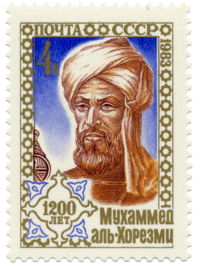Muḥammad ibn Mūsā al-Khwārizmī
Abū ‘Abdallāh Muḥammad ibn Mūsā al-Khwārizmī (Persian: عبد الله محمد بن موسى الخوارزمی), earlier transliterated as Algoritmi or Algaurizin, (c. 780 – c. 850) was a Persian mathematician, astronomer and geographer during the Abbasid Caliphate, a scholar in the House of Wisdom in Baghdad.In the twelfth century, Latin translations of his work on the Indian numerals introduced the decimal positional number system to the Western world. His Compendious Book on Calculation by Completion and Balancing presented the first systematic solution of linear and quadratic equations in Arabic. In Renaissance Europe, he was considered the original inventor of algebra, although it is now known that his work is based on older Indian or Greek sources. He revised Ptolemy's Geography and wrote on astronomy and astrology.Some words reflect the importance of al-Khwarizmi's contributions to mathematics. "Algebra" is derived from al-jabr, one of the two operations he used to solve quadratic equations. Algorism and algorithm stem from Algoritmi, the Latin form of his name. His name is also the origin of (Spanish) guarismo and of (Portuguese) algarismo, both meaning digit.
Personal facts

| Birth date | January 01, 0780 |
|---|---|
| Date of death | January 01, 0850 |